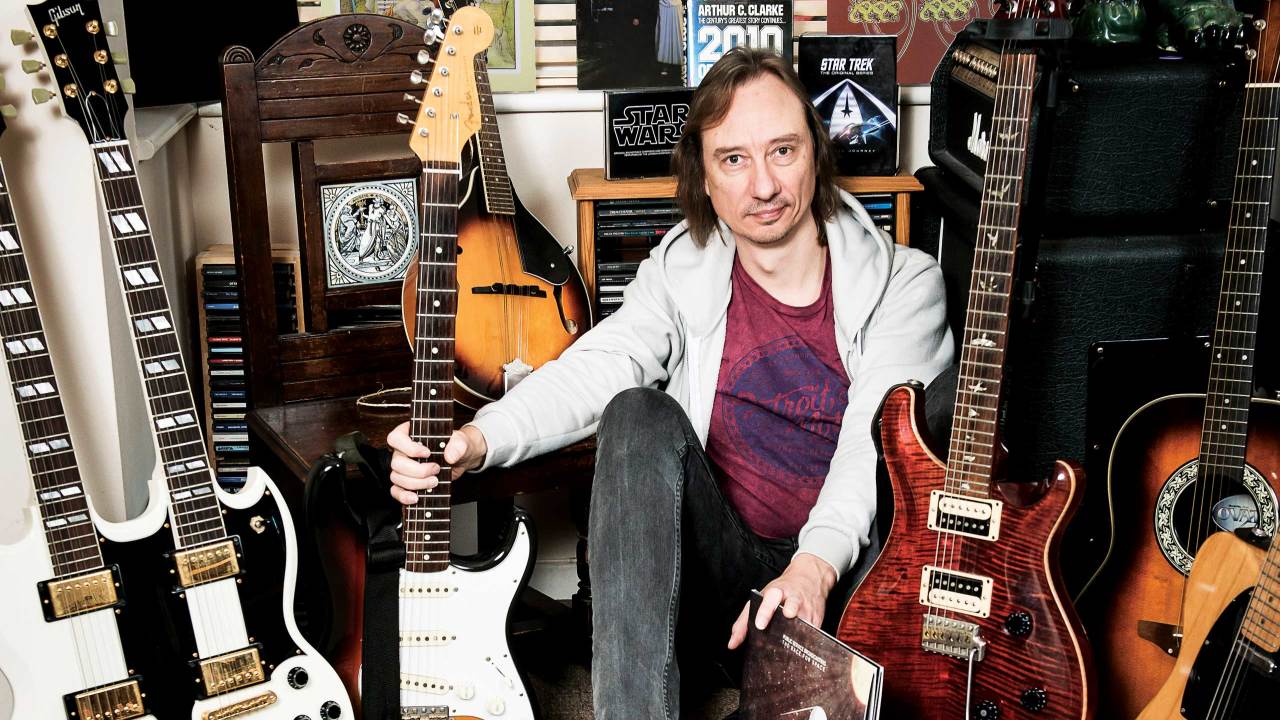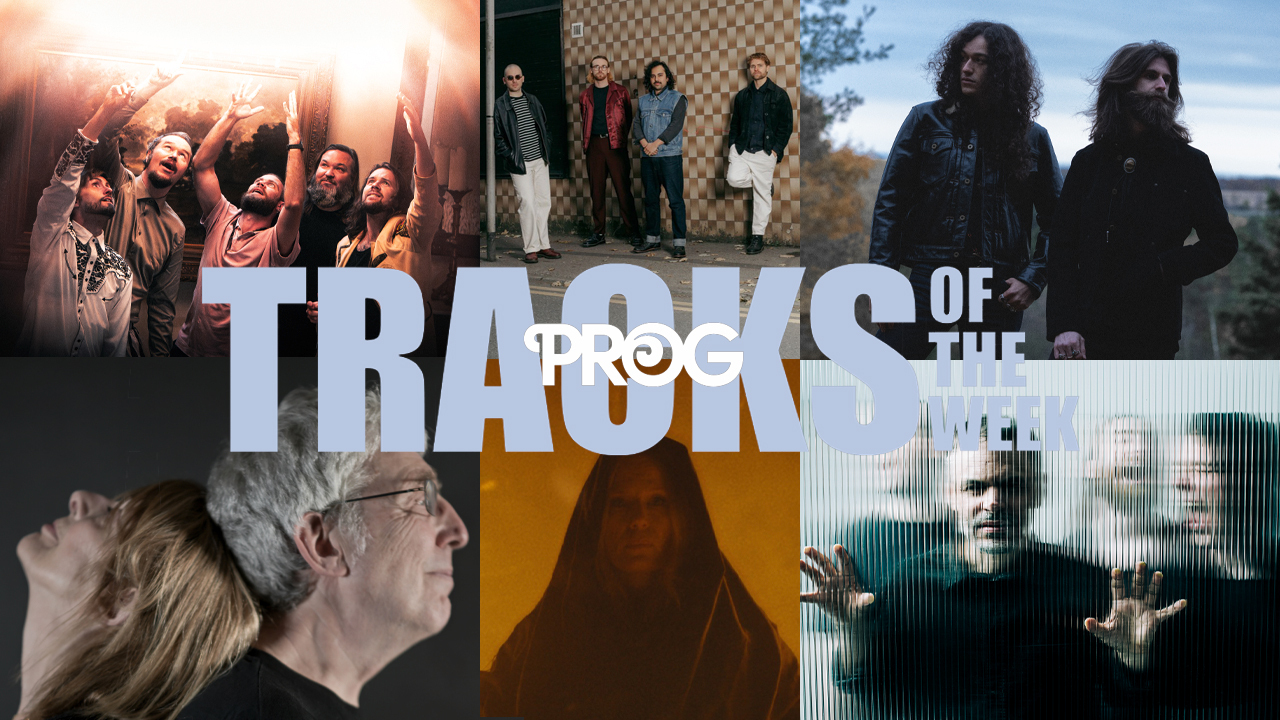My Record Collection: Dr Stuart Clark
Renowned astronomer, author and Guardian blogger has combed time, space and several guitar shops for a galaxy of progressive music delights.

Select the newsletters you’d like to receive. Then, add your email to sign up.
You are now subscribed
Your newsletter sign-up was successful
Want to add more newsletters?

Every Friday
Louder
Louder’s weekly newsletter is jam-packed with the team’s personal highlights from the last seven days, including features, breaking news, reviews and tons of juicy exclusives from the world of alternative music.

Every Friday
Classic Rock
The Classic Rock newsletter is an essential read for the discerning rock fan. Every week we bring you the news, reviews and the very best features and interviews from our extensive archive. Written by rock fans for rock fans.

Every Friday
Metal Hammer
For the last four decades Metal Hammer has been the world’s greatest metal magazine. Created by metalheads for metalheads, ‘Hammer takes you behind the scenes, closer to the action, and nearer to the bands that you love the most.

Every Friday
Prog
The Prog newsletter brings you the very best of Prog Magazine and our website, every Friday. We'll deliver you the very latest news from the Prog universe, informative features and archive material from Prog’s impressive vault.
“There was never a time when I wasn’t fascinated by space – I do wonder if my interest in it shaped my music taste.
One of the very earliest records I liked was the Star Wars soundtrack for the big, symphonic sound John Williams had created. Later, I was given a compilation album of chart hits themed around space, called Space Invasion. A radio edit of Fireball by Deep Purple was on it and that set me on some sort of a path. I loved the guitar, Ian Gillan’s epic voice… and gradually, as I explored more music, I found that prog was perfect for me because it mixed the symphonic with the power of guitars.
My family were interested in music, but I fell in love with it completely. The first album I totally took to my heart was Jeff Wayne’s War Of The Worlds, which I saved up for after hearing Forever Autumn and The Eve Of The War. It pulled all the threads that I liked together – the orchestra, rock music and a science fiction story. Friends of mine who were very into it bought the performing licence from Jeff Wayne and I’ve played their show twice now in a band of seven: one run in St Albans and another run at the Minack Theatre in Cornwall. That was unbelievable, playing the guitar solo from Thunderchild up on the cliffs. It doesn’t get much better than that!
Deep Purple gave me colour, excitement, classical influences and long songs that were improvisational. But I wanted longer songs, to go big. Then I found Rush, through Exit… Stage Left. This was rock, but not like I’d ever heard it. Alex Lifeson is a god – I remember watching this on video and thinking: ‘One day I’m going have a guitar like that and I’m going to know how to play it.’ I never knew rock music could uplift, astound and move you in that way. It took me to Planet Rush. The addiction started, and I’ve now seen them over 50 times.
I never knew rock music could astound in this way. I went to Planet Rush.
At school in Welwyn Garden City, when Iron Maiden’s The Number Of The Beast came out, it swept the place. It was another of those ‘I’m hearing something that I’ve never heard before’ moments. I loved the longer stuff; their musicality and ambition was something you could wallow in. New album The Book Of Souls has so much great stuff on there too. Please let Bruce Dickinson write that solo album he’s promised, based on what he’s done here.
I tend be obsessive about certain records, but I made an effort to branch out and that’s how I got into Yes. Jon Lord was brilliant, but Rick Wakeman opened me up to even greater keyboard parts. Yessongs sums this up in a sense – I’m always blown away by the solo Rick plays at the end of Starship Troopers. He builds the tension, then it explodes with this wonderful keyboard sound. Moments like that make you go: ‘Bring it on! Just play that forever!’
Sign up below to get the latest from Prog, plus exclusive special offers, direct to your inbox!
I saw Porcupine Tree support Dream Theater on their Metropolis Pt 2 tour. They played Dark Matter and there was just something soaring and wonderful about it that got me hooked. When In Absentia came out, I totally loved it, particularly The Sound Of Muzak. I was sad when they finished. I saw them half a dozen times and I remember they tested out Anesthetize on tour before it went on record. Steven Wilson introduced it one night, saying, ‘We’re gonna do the long one,’ and the whole place cheered. He said, ‘Why does that automatically make it good?’ It made me think: prog fans like ambition. We like the journey, the narrative of the through-composition. That’s what classical music is all about, the linking of different moods and styles so you feel something complete has happened to you. It took me a long time to understand this idea and only got it this year thanks to Charles Hazlewood’s brilliant series [Prog Rock With…] on Radio 2.
Linked to Porcupine Tree is Opeth, whom I got into because of Heritage and Pale Communion, but I didn’t like the idea of the death metal vocals of earlier stuff. Recommended to me by a friend at work, they said, ‘Just give it a go – sooner or later you won’t even notice.’ Randomly, Harlequin Forest from Ghost Reveries came on Spotify one day and I thought, ‘This is probably the greatest track I’ve heard in the last decade.’ It was like 2112, when Geddy Lee uses the falsetto for the screaming priests, then the more natural register for the hero. Again, I’d never heard anything like Opeth before. But for all their technical brilliance, they have great feel.
When Rush were on hiatus I was desperately trying to fill the void and I read about Spock’s Beard. I didn’t fully get on with them until V. Here they could do the pop song, All On A Sunday, but also the big epics, like The Great Nothing. I saw them on that tour and they were utterly brilliant. Someone shouted out from the audience, ‘We’re not worthy!’ and Neal Morse said, ‘Oh, I think you are.’ I thought they were destined for greatness, then Neal left and things were never the same again.
Moon Safari were a recommendation too, and what drew me in were the vocal harmonies. Yes did that to a certain extent, but with Moon Safari, everything they do with their voices and the scale is just brilliant. When I put Blomljud on, it lifts my spirit. They sample radio communications from the Apollo missions, so that’s a little touch I like. And they’re supporting Yes at the Royal Albert Hall. I think that might be one of my gigs of the year already…
Before going to Sonisphere Festival in 2014, I checked out all the bands online and found a video of Ghost playing Rock In Rio. There was something about these guys in black monks’ robes playing the beautiful riffs of Infestissumam – then Papa Emeritus turns up! I was sold. Meliora is the one for me. Sounds great, brilliant songs – Deus In Absentia is like a show tune. I hope they go the full distance and one day we get an orchestral epic of prog madness to rival Journey To The Centre Of The Earth, on ice.
Public Service Broadcasting emailed me a lovely little message when Gagarin came out, saying, ‘Here’s something we did, hope you like it.’ I’m bombarded with press releases every day and it slipped down the strata of my email, then I felt too embarrassed to reply. But I finally checked it out, loved it, got the album, The Race For Space. What a musical document. It has to be played as a whole album – they narrate the story beautifully. I’d like them to go back and do The War Room EP as an LP – there’s so much more to do there. PSB are keepers and I can’t wait to see what they’ll do next.”
Stuart’s book The Unknown Universe is out now. You can find him at www.stuartclark.com or www.theguardian.com/science/across-the-universe, and via Twitter @DrStuClark.
- Meet the best turntables for your record collection
- Smaller budget? No problem! These are the best budget turntables
Jo is a journalist, podcaster, event host and music industry lecturer who joined Kerrang! in 1999 and then the dark side – Prog – a decade later as Deputy Editor. Jo's had tea with Robert Fripp, touched Ian Anderson's favourite flute (!) and asked Suzi Quatro what one wears under a leather catsuit. Jo is now Associate Editor of Prog, and a regular contributor to Classic Rock. She continues to spread the experimental and psychedelic music-based word amid unsuspecting students at BIMM Institute London and can be occasionally heard polluting the BBC Radio airwaves as a pop and rock pundit. Steven Wilson still owes her £3, which he borrowed to pay for parking before a King Crimson show in Aylesbury.

